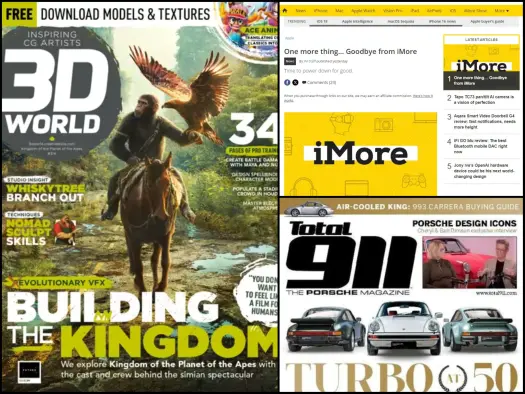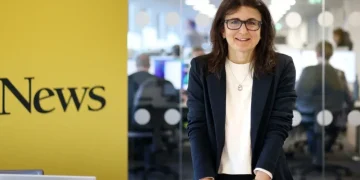
Update 3 October 2024: Future-owned Total Film magazine is closing its print edition after 27 years.
Issue 356 of Total Film, hitting newsstands on 10 October, will be its last.
The magazine told readers: “We like to think that this final print edition is a showcase of everything that Total Film magazine strived for, with a thrilling blockbuster on the cover, A-list interviews, fair and impartial reviews, smaller interesting movies nestled alongside the more mainstream fare, and above all else a passion for cinema radiating out of every page.”
It added that its subscriptions team will get in touch with subscribers to “discuss next steps”.
Total Film’s “archive content and expert movie and TV writing will continue to live on” online, where the Total Film brand is housed as part of the Games Radar website.
Original story 27 September 2024: Future has announced it is closing a number of “low to no growth assets” including magazines and events.
The publisher said in a trading update that it is carrying out continuous “portfolio optimisation… to ensure the Group is best positioned to deliver sustainable organic growth.
“During Q4, the Group began the closure of a number of non-core or low to no growth assets, including its external video production unit, selected events and a small number of print and digital brands, representing c.£15m of annualised revenue and with margins below the Group’s average.”
The overall group is expected to bring in around £786m in revenue this year (down from £789m in 2023).
Future said it was unable to share the number of titles closing and potential redundancies as a consultation process is ongoing.
However the magazine brands confirmed to be ceasing publication include: 3D World, All About Space and Total 911.
Tech publications close amid ‘monumental changes’ to market
iMore, a US-based website covering Apple, has also announced its closure after more than 15 years.
Editor-in-chief Gerald Lynch told readers on Thursday: “iMore leaves the stage at a pivotal crossroads for online publishing, where the battle for readers’ time and attention is more demanding than ever before, and the aforementioned AI advances and search discovery methods further complicate the playing field.
“It’s been a joy to serve such a passionate readership over the years, but it’s time to pass the baton to new writers, new sites, and new formats.”
The website will stay online so users can continue to access its archive articles, Lynch said, while its forum will close down on 1 November.
Another Future tech publication, computing hardware website AnandTech, announced at the end of August it was closing after more than 27 years although its archive will “live indefinitely”.
Editor-in-chief Ryan Smith told readers: “The years have also brought some monumental changes to the world of publishing. AnandTech was hardly the first hardware enthusiast website, nor will we be the last. But we were fortunate to thrive in the past couple of decades, when so many of our peers did not, thanks to a combination of hard work, strategic investments in people and products, even more hard work, and the support of our many friends, colleagues, and readers.
“Still, few things last forever, and the market for written tech journalism is not what it once was – nor will it ever be again. So, the time has come for AnandTech to wrap up its work, and let the next generation of tech journalists take their place within the zeitgeist.”
Future’s sister technology websites Tech Radar, Tom’s Guide, Windows Central and Android Central are all continuing to publish.
Future has also this month closed two long-running media industry trade publications in the US: Broadcasting + Cable, and Multichannel News.
Press Gazette understands the decision to close the external video production unit was because it is not core to the Future business. However, its overall video division Future Studios, formed after the acquisition of video agency Barcroft in 2019, will continue to create social video content and the company continues to look at the opportunities from video.
Future’s ‘Growth Acceleration Strategy’
Future said the latest closures were part of its Growth Acceleration Strategy, announced in December alongside its 2023 financial results.
The strategy was said to involve investment of between £25m and £30m over two years, with 200 roles including 150 in editorial expected to be created as a result.
In its half-year results published in May, Future said it had so far created more than 40 new roles as part of the strategy since the start of this financial year in October 2023.
Chief executive Jon Steinberg said in a statement to investors this week: “We are making good progress with our Growth Acceleration Strategy since its launch last December. The progress, combined with our return to organic growth and the stabilisation of our online audience trends, means we will deliver a FY24 performance in line with market expectations.
“Whilst we remain mindful of the macro backdrop and the ongoing evolution of the media landscape, including updates in the search market, the highly cash generative profile of the Group and our cost base flexibility ensures we are well positioned as we look ahead.”
Future shares ended the week down 3% compared with Monday on £10.25 giving the company a market cap of £1.15bn. In 2021 Future was worth nearly four times that valuation.
The post Future closes titles and events deemed ‘low to no growth assets’ appeared first on Press Gazette.




























